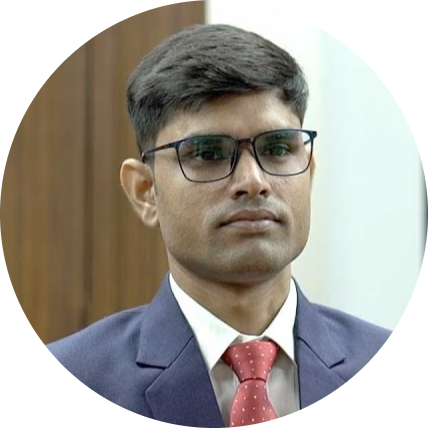| 70th BPSC Important Dates | |
| Date Of Notification | 27th June 2024 |
| Prelims | 13th/14th December 2024 |
| Mains | To Be Announced |
| Interview | To Be Announced |
Bihar PCS
Important Dates
Our BPSC Toppers

Mayank Prakash
AIR-14
66th BPSC

Tarun Pandey
AIR-87
66th BPSC

Kamal Kishor
AIR-112
67th BPSC

Amar Jyoti
AIR-297
66th BPSC
About the Exam
The Bihar Public Service Commission (BPSC) conducts the Combined Competitive Examination (CSE) every year to recruit eligible candidates for various Civil Services in the state of Bihar.
Examination Pattern
The BPSC CSE is a Three-Stage Examination:
|
Examination |
Exam Pattern |
Marks |
| Prelims | General Studies | 150 Marks |
| ⠀ | ||
| Mains | Hindi (Qualifying) | 100 Marks |
| General Studies I | 300 Marks | |
| General Studies II | 300 Marks | |
| Optional (MCQ Based & Qualifying) | 100 Marks | |
| Essay | 300 Marks | |
| Total – 900 Marks | ||
| Interview | – | 120 Marks |
Syllabus
General Studies
BPSC Prelims Syllabus
GENERAL STUDIES
- General Science:
- General appreciation and understanding of science, including matters of everyday observation and experience.
- Current Events:
- Current events of national and international importance.
- History:
- History of India and salient features of the history of Bihar.
- Emphasis on broad general understanding of the subject in its social, economic, and political aspects.
- Familiarity with the broad aspects of the history of Bihar.
- Geography:
- General Geography and geographical division of Bihar.
- Major river systems of Bihar.
- Emphasis on geography of India and Bihar.
- Questions related to physical, social, and economic Geography of the country.
- Main features of Indian agricultural and natural resources.
- Indian Polity and Economy:
- Knowledge on the country’s political system.
- Panchayati raj.
- Community development.
- Planning in India and Bihar.
- Major changes in the economy of Bihar in the post-independence period.
- Indian National Movement:
- Nature and character of the nineteenth-century resurgence.
- Growth of nationalism and attainment of Independence.
- Role of Bihar in the Indian freedom movement.
GENERAL MENTAL ABILITY
- Questions assessing general mental abilities.
BPSC Mains Syllabus
GENERAL STUDIES PAPER-I
- Modern History of India and Indian Culture:
- Broad history of the country (with special reference to Bihar) from about the middle of the nineteenth century.
- Modern history of Bihar:
- Introduction and expansion of western education (including technical education).
- Bihar’s role in the freedom struggle of India:
- Santhal Uprising
- 1857 in Bihar
- Birsa movement
- Champaran Satyagrah
- Quit India Movement 1942
- Chief features of Mauryan and Pal art and Patna Qulam painting.
- Questions on Gandhi, Tagore, and Nehru.
- Statistical Analysis, Graphs, and Diagrams:
- Exercises to test the candidate’s ability to draw conclusions from information presented in statistical, graphical, or diagrammatical form.
- Point out deficiencies, limitations, or inconsistencies.
GENERAL STUDIES PAPER-II
-
- Indian Polity:
- Political system in India including Bihar.
- Indian Economy and Geography of India:
- Planning in India.
- Physical, economic, and social geography of India and Bihar.
-
The Role and Impact of Science and Technology in the Development of India:
-
Questions to test the candidate’s awareness of the role and impact of science and technology in India and Bihar with emphasis on applied aspects.
-
- Indian Polity:
Optionals
BPSC Sociology Syllabus
GENERAL SOCIOLOGY (SECTION-I)
- Scientific Study of Social Phenomena – Emergence of Sociology and its relationship with other disciplines, their scope and approaches. Science and Study of social behavior, the problems of objectivity, reliability and validity. Scientific methods and scientific language; their meaning, goals, types; elements and features. Research Design Techniques of data collection and analysis, Attitude measurements; problems and scales. Concept of social causation with special reference to R.M.Mac’ver.
- Pioneering Contributions to Sociology – Theoretical beginnings- Positivism and evolutionism with reference to Comte, Spencer and Morgan; Historical Sociology contributions of Karl Mark, Maxweber and P.A. Sorokin; Functionalism; E. Durkheim, P.areto. Parsons and Merton, Conflict School; Gumplowicz Dahrenderf and Coser; Recent approaches in Sociology, Micro Sociology, Macro Sociology, Middle Range theories, Neopostitvism, Exchange theories and Interactions Sociology.
- Social Structure and Social Organçation – Concept and types approaches to Social Structure; Structural functionalist school, Structuralist school and Marxist School: Elements of Social Structure-Individual and society; social interaction; social groups, concept and types; concept of status and role, their determinants and types, dimensions of roles in simple and complex societies, role conflict; Social Network; Basic concepts and types, culture and personality, concepts of conformity and social control, agencies of social control; concept of Minority Groups, their relationship with majority; Secularism versus Integration.
- Social Stratification and Mobility – Concept, consequences and types of stratification; inequality and stratification, Dimensions and bases of stratification; Theoretical approaches to the study of stratification, functionalist approach and conflict approach; Social Stratification and Social Mobility; Concept of Sankskritçation and Westernçation. Types of Mobility: intergenerational mobility, vertical versus horçontal mobility, open and closed models of mobility.
- Family Marriage and Kinship – Structure, functions and types of family marriage and kinship; social change and change in age and sex roles; change in marriage, family and kinship; significance of family in industrial society.
- Formal Organçation – Elements of formal and informal structures and organçations, bureaucracy functions, dysfunctions and characteristics, bureaucracy and political development, political socialisation and political participation, modes of participation, democratic and authoritarian forms, voluntary organçations.
- Economic System – Property concepts, social dimensions of division of labour; type of exchange, social aspects of pre- industrial and industrial economic systems; industrialçation and changes in the political, educational religious, familiar and stratificational spheres; social determinants and consequences of economic development.
- Political Systems – Concepts, elements and types of political systems: functions of a political system, institutions under the political system; political processes with reference to individuals, groups, political organçations, parties and other agencies. Concepts, bases and types of power, authority and legitimacy; Concept of Stateless societies; political socialçation versus political participation; properties of State. Power of elites, and masses in democracy and in totalitarian societies; political parties and voting, Leadership democratic order and democratic stability.
- Educational Systems – Concepts and goals of education; Schools of philosophy;- Naturalism, Idealism and pragmatism, their bearing on education; importance of education in society, democracy, international understanding and nationalism. New trends in education; Role of various agencies-school home society state and religion in education and socialçation. Population Education- its concepts and components, Education as a medium of cultural reproduction, indoctrination, social stratification, mobility and modernisation.
- Religion – The religious phenomenon; the concepts of sacred and protan, social functions and dysfunctions of religion, magic religion and science, social change and religious secularisation.
- Social Change and Development – Factors of social change, economic, biological and technological; Theories of social change – evolutionary, functional and conflict; social change, modernisation and development; Democratisation equality and social justice; social reconstruction.
SOCIETY OF INDIA (SECTION-II)
- Indian Society – Features of traditional Hindu Social Organisation, Socio-cultural dynamics through the ages, impact of Buddhism, Islam and West on Indian Society, factors in continuity and change.
- Social Stratification – Caste system and its transformation, Economic Structural and Cultural view about Caste, origin of the Caste system, issues of inequality and social justice among Hindu and Non-Hindu castes, Caste mobility, Casteism, Backward caste versus Backward Classes, Scheduled Caste and untouchability, changes among Scheduled Castes, eradication of untouchability, industrial and agrarian class structures, rising trends in inter caste relations in Bihar under the impact of Mandal Commission and its reservation policy.
- Family, Marriage and Kinship – Regional variation in Kinship system and its socio-cultural correlates, changing aspects of Kinship, The joint family system its structural and functional aspects, its changing form and disorgançation, Marriage among various ethnic groups, economic and Caste categories, its changing trend in future, impact of legislation and socioeconomic changes upon family and marriage, inter caste marriages-causes and consequences in Bihar intergeneration gap and youth unrest, changing status of women, women and social development.
- Economic System – Jajmani System and its bearing on the traditional society, Market economy and its social consequences, occupational diversification and social structure, professional Trade Unions, Social determinants and consequences of economic development, Economic inequalities, exploitation and corruption; causes of economic backwardness in Bihar, potentialities of economic growth in Bihar, Relationship between economic growth and social development with specific reference to Bihar.
- Political System – Functioning of a democratic political system in a traditional society, political parties and their social composition, origin of political elites and their social orientation, decentralçation of power, political participation, voting pattern in Bihar, relevance of Caste, community and economic factor in voting behaviour in Bihar, its changing trends, Functions dysfunctions and characteristics of India Bureaucracy, Bureaucracy and political development in India, concept of mass society, Socio-political sources of mass movement in India.
- Educational System – Education and society in the traditional and modern contexts, educational inequality and change, education and social mobility, educational problems of women, Backward Classes and the Scheduled Castes, causes of educational backwardness in Bihar, Functional and dysfunctional aspects of Mushroom growth of institutions in Bihar; Prospects and problems of higher education in Bihar, New educational Policies, Mass.
- Religion – Demographic dimensions, geographical distribution and neighbourhood, living patterns of major religious categories; Interreligiousinter-actions and its manifestations in the problems of conversion Minority status, communications and secularism; impact of various religious Movernment in India. (Buddhism, Islam, Christianity, Brahmoism and Arya Samaj movement on caste system in India; westernçation and modernçation in Bihar; the cohesive and decisive factors, impact of growing religious and politics interrelationship of India’s social organisation.
- Tribal societies – Major tribal communities in India, their distinctive features; tribe and case their acculturation and integration; problem of Bihar tribes (social, economic and Political), different approaches to tribal welfare, constitutional and governmental safeguards; tribal movements in India. The Tanabhagat movement, the Birsa movement and the Jharkhand movement, their significance in tribal development.
- Rural social system and community development – Sociocultural dimensions of the village community, traditional power structure, democratçation and leadership, poverty, indebtedness and bonded labour, social consequences of land reforms, community Development Programme and other planned development projects of Green Revolution, New strategies of rural development.
- Urban Social Organçation – Continuity and change in the traditional causes of social organçation, namely Kinship, Caste and religion in the urban context, stratification and mobility in urban communities, ethnic diversity and community integration, urban neighbourhoods; rural urban differences in demographic and socio- cultural characteristics and their social consequemces.
- Population dynamics – Theories of population growth Malthusian, biological, demographic transition, optimum population socio-cultural aspects of population composition (sex, age, martial status), determinants of fertility, mortality and migration. Need of population policy in India; population explosion and other determinants factors; social psychological cultural and ecomic determinants behind population acceptance of family planning practices in India. Family Planning Programmer through first to eighth five year plans; population education; concept, goals, aspects, agencies and techniques of population education.
- Social Change and modernçation – Problems of role conflict youth unrest- intergenerational gap, changing status of women. Major sources of social change and of resistance to change, impact of west reform movements, social movements, industrialçation and urbançation pressure groups, factors of planned change, five year plans legislative of executive measures; process of change sanskritçation, westernçation and modernçation means of modernçation man media and education, problems of change and modernçation, structural contradictions and break-downs. Current social evils-corruption and Nepotism Smugglling, Black Money.
BPSC Political Science & International Relations Syllabus
SECTION–I
POLITICAL THEORY (PART–A)
- Main feature of ancient Indian Political Thought ; Manu and Kautilya; Ancient Greek thought Plato. Aristotle; General characteristics of European medieval political thought; St. Thomas Aquinas, Marsiglip of padua; Machavelli. Hobbes, Locke. Montesq-uien, Rousseau, Bentham, J.S. Mill, T.H.Green, Hegal Marx, Lenin and Mao-se Tung.
- Nature and scope of political Science; Growth of political Science as a discipline. Traditional Vs. Contemporary approaches; Behaviourlism and Post-behavioural development; Systems theory and other recent approaches to political analysis, Marxist approach to political analysis.
- The emergence and nature of the modern State: Sovereignty; Monistic and Pluralistic analysis of sovereignty; Power Authority and Legitimacy.
- Political obligation: Resistance and Revolution; Rights, Liberty, Equality, Justice.
- Theory of Democracy.
- Liberalism, Evolutionary Socialism (Democratic and Febian); Marxian Socialism; Fascism.
GOVERNMENT AND POLITICS WITH SPECIAL REFFRENCE TO INDIA (PART–B)
- Approaches to the study of Comparative Politics; Traditional, Structural Functional approach.
- Political Institution; The Legislature, Executive and Judiciary; Parties and Pressure Groups; Theories of party system. Lenin, Michels and Duverger; Electoral System; Bureaucracy- weber’s view and Modern critiques of weber.
- Political Process: Political Socialisation, Modernçation and Communication; the nature of the non-western Political Process; A general study of the Constitutional and Political Problems affecting Afro-Asian Societies.
- Indian Political system:
- The Roots; colonialism and nationalism in India; A general Study of modern Indian Social and Political thought; Raja Ram Mohan Roy, Dadabhai Nauroji, Tilak, Sri Aurobindo, Iqbal, jinnah, Gandhi, B.R.Ambedkar, M.N.Roy, Nehru and Jay Prakash Narain.
- The Structure: Indian Constitution, Fundamental Rights and Directive Principles; Union Government; Parliament, Cabinet, Supreme Court and Judicial Review; Indian Federalism Centre-State relation, State Government role of the Governor; Panchayati Raj, Panchayati Raj System in Bihar.
- The Functioning: Class and Caste in Indian Politics, Politics of regionalism, linguism and Communalism. Problems of Secularçation of the Policy and national intergration . Political elities; the changing Composition; Political Parties and Political Participation; Planning and Developmental administration, Socio-economic changes and its impact on Indian democracy, Regionalism with Special reference to Jharkhand Movement in Bihar.
SECTION–II
PART–I
- The nature and functioning of the Sovereignation State System.
- Concepts of International Politics; Power; National Interest; Balance of Power, ”Power vaccum.”
- Theories of International Politics, The realist theory; System theory: Decision making.
- Determinants of foreign Policy: National Interest; Ideology; Elements of National Power (including nature of domestic socio-political institution).
- Foreign Policy: Choices – Imperialism; Balance of Power; Alleg hances; Isolationalism: Nationalistic Universalism (pax Britiannica pax Amricana Pax-Sovietica); The “Middle Kingdom” Complex of China; Non alignment.
- The cold war: Origin, evolution and its impact on international relation: Defence and its impacts: a new Cold War.
- Non-alignment: HEANING Bases ( National and International) the non-aligned Movement and its role in international relations
- De-colonçation and expansion of the international community; Neo-colomaism and racialism, their impact on international relations; Asian-African resurgence.
- The present International economic order; Aid trade and economic development, the struggle for the new International Economic, Order; Sovereignty over natural resources; the crisis in energy resources.
- The role of International Law in International relations; the international Court of Justice.
- Origin and Development of International Organisations; The United Nations and specialçed Agencies; their role in international relations.
- Regional Organçation: OAS, OAU, the Arab League, the ASEAN, the EEC, their role in international relations.
- Arms race disarmament and arms control; Conventional and nuclear arms, the Arms trade, its impact on Third World role in international relations.
- Deplomatic theory and practice.
- External intervention: Ideological, Political and Economic; Cultural imperialism, Covert intervention by the major power.
PART–II
- The uses and mis-uses of nuclear energy; the impact of nuclear weapons on internation relations; the partial Test-ban, Treaty; the nuclear Neo-Proliferation. Treaty (NPT) peaceful nuclear explosions (PNE).
- The problems and prospects of the Indian Ocean being made a peace zone.
- The Conflict situation in West Asia.
- Conflict and co-operation in South Asia.
- The (Post-war) foreign policies of the major powers; United States, Soviet Union, China.
- The third world in international relations; the North-South “Dialogue” in the United Nations and outside.
- India’s foreign policy and relations; India and the Super powers; India and its neighbours; India and South east Asia; India and African Problems; India’s economic diplomacy; India and the question of nuclear weapons.



